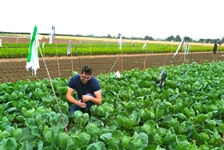News
See below for the latest news from the Warwick Crop Centre.
For our latest publications see Crop Centre in Print
Research placements in Entomology and Plant Pathology at the School of Life Sciences
 The placements, funded by BBSRC, will last for 10 weeks during the summer vacation of 2016 and are for second year undergraduate students.
The placements, funded by BBSRC, will last for 10 weeks during the summer vacation of 2016 and are for second year undergraduate students.
Each student will be placed with a research group in the School of Life Sciences and work as part of the group, undertaking a small research project related to the group's activities. You will learn about the research undertaken, and techniques used.
Dave Chandler and Liam Harvey feature in February edition of AHDB Grower
The February edition of AHDB Grower contains an article entitled 'Biology to rely' on which covers presentations by Dave, Liam and others at the AAB IPM Conference in November 2015. Dave and Bill Clark from NIAB delivered the GCRI Trust's Bewley Lecture.
Kat Hayles presenting at carrot technical seminar
Kat Hayles, a PhD student at Warwick Crop Centre, will be giving a presentation entitled 'Understanding the ecology and epidemiology of Pythium violae to enable disease management in carrots' at the AHDB Horticulture/BCGA Carrot Technical Seminar on 22 March.
